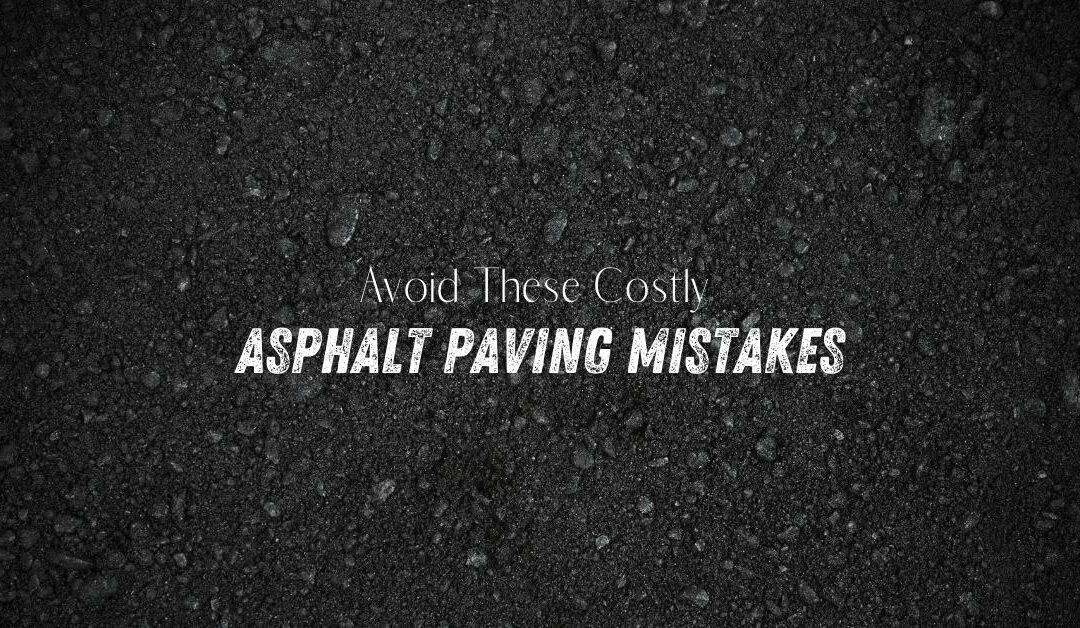It’s no secret that drainage is key to a successful asphalt installation. If water isn’t directed away from the pavement structure, it can weaken the soil beneath or even cause cracks in the asphalt down the road. Let’s look at some of the most common mistakes people make when it comes to parking lot and driveway drainage and how to avoid them!
WHY DOES Parking Lot & Driveway Drainage MATTER?
Drainage is the process of directing water away from your pavement surface. This is important because moisture can cause damage to your asphalt.
Water can also wash away the foundation beneath your parking lot or driveway, causing it to collapse. Too much water underneath your pavement can turn its foundation into mud. And if you remember making mud pies way back when, you know how stable mud is!
Water may also cause the soil beneath your driveway to swell. If this happens, you’re looking at heaving problems. Heaving is when the ground underneath expands and pushes against the driveway, causing cracks and other damage.
So how can you ensure your asphalt drains water properly?
How to Ensure Proper Drainage
There are several ways to ensure proper parking lot and driveway drainage. The most common is to install a drainage system around the perimeter of your driveway. This can be as simple as digging a trench and filling it with gravel or installing a more complex system with pipes and catch basins.
Surface drainage is crucial to help water drain off the top of your asphalt. For good surface drainage, your asphalt contractor must slope your pavement correctly to ensure the rapid flow of water off the surface.
Drainage starts with the installation of your asphalt. The slope of the asphalt matters!
Asphalt Slope Is Where Drainage Begins
The slope of an asphalt surface should “send water to curbs and gutters or to adjacent drainage ditches or swales so that it slopes away from your home or other structures. This allows water to run off of the driveway instead of pooling on it.” (1)
For roads and longer driveways, you need a slope of at least 2%, while parking lots need a minimum slope of 1.5% to ensure adequate surface water drainage and avoid standing water.
If your slope is less than 1%, you’ll end up with puddles that stand on your asphalt surface. Standing water can seep into the pavement structure and cause asphalt problems down the road. (2)
Removing Water to the Right Place
But where does all the water go when it leaves your driveway area?
It’s also crucial that runoff is “collected with a curb and gutter and channeled off the pavement to a properly designed stormwater collection system.” (3)
When constructing a parking lot or driveway, you must consider city, town, and county policies regarding runoff water. Many municipalities structure codes to meet several essential goals for the community!
The goals of stormwater management include:
- Protecting our environment
- Reducing flooding to protect people and property
- Reducing demand on public stormwater drainage systems
- Supporting healthy streams and rivers
- Creating healthier, more sustainable communities (2)
With an asphalt contractor who understands your area’s drainage issues, you can ensure your community is a better place to live!
Common Driveway Drainage Mistakes
One of the most common mistakes people make with driveway drainage is hiring an inexperienced asphalt contractor who doesn’t grade properly or plan for drainage.
If you don’t have any way to direct water away from your driveway, it’s only a matter of time before problems arise, especially in South Carolina’s humid climate!
Another mistake is not properly maintaining your drainage system. Gravel can wash away over time, pipes can become clogged, and catch basins can fill up with dirt and debris. It’s essential to regularly check your system and make sure it’s still doing its job.
Finding an experienced contractor who understands grading is crucial!
A driveway or parking lot that slopes in the wrong direction can cause problems for other structures. If your driveway slopes towards your home, business, or outbuilding, water can run towards them instead of away, causing severe damage to your foundation or siding and even creating mold or mildew issues.
How to Avoid Drainage Mistakes
The best way to avoid these mistakes is to hire a professional contractor. They will be able to grade your slope properly to let water run off the surface of your driveway. They can also install a proper drainage system, so water does not pool in the wrong places.
Talk to your asphalt contractor when you get a quote and ask how they plan to prevent water damage to the surface of your driveway and the subsoil underneath.
An experienced contractor will have a plan to keep your driveway or parking lot pavement solid, level, and crack-free for years to come!
Hiring a professional is the best way to ensure your pavement lasts for decades!
We Can Help
AMP Paving can meet your needs and exceed your expectations if you’re looking for an experienced asphalt contractor in the Columbia, South Carolina area. Our experience covers both commercial and residential work. And our professionalism and industry knowledge is unmatched by other asphalt paving companies in our area.
Give us a call today with any questions or for a free estimate!

